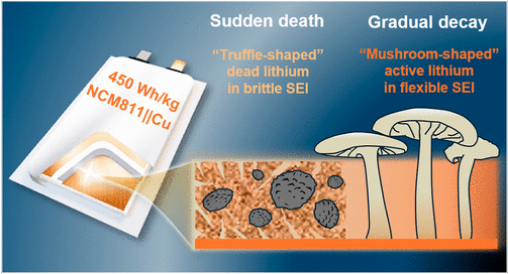
无阳极锂金属电池(AFLMBs)理论上可实现超过500 Wh kg–1的超高能量密度,然而现有研究主要集中于能量密度低于350 Wh kg–1的体系,这类电池既缺乏相较于商用锂离子电池的优势,也难以揭示高能量密度下电池衰退的机理。
研究组成功研制出安时级、450 Wh kg–1能量密度的无阳极锂金属电池,其库仑效率超过99%,并通过电池、电极及原子尺度的联合分析揭示了其衰退机制。在高能量密度条件下(正极面容量5.6 mAh cm–2,电解液用量2.0 g Ah–1),电池性能衰减主要受非活性锂的主导作用。研究发现了“突然失效”与“渐进衰减”两种典型衰退模式:前者与脆性固态电解质界面(SEI)导致的“块菌状”死锂相关,后者则与柔性SEI交织的“蘑菇状”活性锂形成有关。
其中,渐进衰减模式因退化速度较慢且死锂量最少,展现出更优的循环寿命与安全性。此外,研究证实SEI的弹性变形相较于杨氏模量是稳定锂金属的更可靠参数。这些发现与既往低能量密度研究存在显著差异——在较低库仑效率和大量死锂存在时,低能量密度电池仍可循环多次,而该研究建立了更可靠的高能量密度电池“组成-结构-性能”失效关联机制,为开发实用化高能量密度无阳极锂金属电池提供了理论依据。
附:英文原文
Title: From Cell to Atomic Level: Understanding the Degradation in 99% Coulombic Efficiency and 450 Wh kg–1 Anode-Free Pouch Cells
Author: Lei Liu, Yuxuan Xiang, Jianhui Wang
Issue&Volume: October 28, 2025
Abstract: Anode-Free Lithium Metal Batteries (AFLMBs) promise ultrahigh energy densities beyond 500 Wh kg–1, yet prior work mainly studied on <350 Wh kg–1 AFLMBs, which lack advantages over commercial Li-ion batteries and mechanistic understanding of battery degradation at high-energy levels. Here, we developed Ah-level 450 Wh kg–1 AFLMBs with >99% Coulombic efficiency (CE) and examined their degradation across cell, electrode, and atomic dimensions. Under high-energy-density conditions (5.6 mAh cm–2 cathode, 2.0 g Ah–1 electrolyte), the battery degradation behavior is dictated by the dominant inactive lithium component. Two typical modes of “sudden death” and “gradual decay” are revealed, which are associated with “truffle-shaped” dead lithium caused by brittle solid electrolyte interphase (SEI) and “mushroom-shaped” active lithium interwoven with flexible SEI, respectively. The gradual-decay mode, with slower degradation and minimized dead lithium, exhibits a superior lifespan and safety. In addition, the SEI’s elastic deformation emerges as a more reliable parameter than Young’s modulus for lithium metal stabilization. These findings are different from previous lower-energy-density studies, wherein the batteries could run many cycles even under a relatively low CE and abundant dead lithium, thus establishing a more reliable composition–structure–performance correlation for battery failure and facilitating the development of high-energy-density practical AFLMBs.
DOI: 10.1021/jacs.5c09562
Source: https://pubs.acs.org/doi/abs/10.1021/jacs.5c09562
JACS:《美国化学会志》,创刊于1879年。隶属于美国化学会,最新IF:16.383
官方网址:https://pubs.acs.org/journal/jacsat
投稿链接:https://acsparagonplus.acs.org/psweb/loginForm?code=1000
